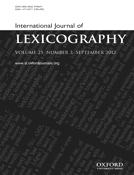
INTERNATIONAL JOURNAL OF LEXICOGRAPHY
Scope & Guideline
Advancing the Art of Lexicography
Introduction
Aims and Scopes
- Lexicographical Theory and Methodology:
The journal emphasizes the theoretical foundations of lexicography, exploring various methodologies employed in dictionary compilation, definition structuring, and user-oriented design. - Cross-Linguistic and Cross-Cultural Studies:
It investigates lexicographical practices across different languages and cultures, facilitating a comparative understanding of how dictionaries function in diverse linguistic contexts. - Digital Lexicography:
A significant focus is on digital dictionaries and their evolving role in language use, including the impact of technology on dictionary accessibility and design. - Neology and Language Change:
The journal addresses the documentation of new words and expressions, examining how dictionaries adapt to linguistic innovation and the dynamics of language evolution. - User Studies and Dictionary Utilization:
Research on how different user groups, including students and professionals, engage with dictionaries is a key area, highlighting the practical implications of lexicographical decisions.
Trending and Emerging
- Artificial Intelligence and Lexicography:
Recent publications increasingly explore the integration of AI technologies, such as ChatGPT, in dictionary creation and usage, indicating a trend towards innovative approaches in lexicographical practice. - Bilingual and Multilingual Lexicography:
There is a growing emphasis on bilingual and multilingual dictionaries, reflecting the globalized nature of language use and the need for resources that cater to diverse linguistic communities. - User-Centric Lexicography:
Emerging studies focus on user experience and engagement, analyzing how dictionary design impacts usability and accessibility for different user groups. - Lexicography in Specialized Domains:
An increased number of papers concentrate on dictionaries related to specific fields, such as law, medicine, and technology, highlighting the importance of specialized lexicographical resources. - Neologisms and Contemporary Language Use:
The documentation and analysis of neologisms are gaining prominence, reflecting the rapid changes in language driven by social media, technology, and cultural shifts.
Declining or Waning
- Traditional Print Dictionaries:
There has been a marked decrease in studies focusing solely on print dictionaries, as the field shifts toward digital solutions and online resources. - Historical Lexicography:
Although historical perspectives remain important, fewer papers are being published that solely concentrate on the historical aspects of lexicography, suggesting a shift towards contemporary applications. - Language-Specific Dictionaries:
Research centered on dictionaries for specific languages, particularly those that are less widely spoken, appears to be diminishing in favor of broader, cross-linguistic analyses. - Static Definitions and Entries:
The focus on static definitions is declining, as there is a growing interest in dynamic and context-sensitive definitions that reflect actual language use. - Solely Theoretical Approaches:
There is a decreasing trend in purely theoretical discussions, with a preference for empirical research that integrates theory with practical lexicographical applications.
Similar Journals
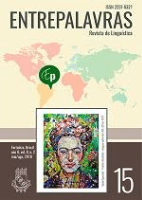
Entrepalavras
Advancing Language Studies with Collaborative InsightsEntrepalavras, an esteemed journal published by Federal University of Ceará, serves as a vital platform for scholarly discourse in the field of linguistics, language studies, and communication. Since its inception, the journal has embraced an Open Access model, promoting widespread dissemination of research findings and fostering collaboration among researchers, professionals, and students alike. With its ISSN 2237-6321 and consistent focus on contemporary linguistic issues and educational practices, Entrepalavras contributes meaningfully to the academic community, particularly in Brazil and beyond. By providing open access to valuable research, the journal aims to bridge gaps in knowledge, stimulate innovative approaches, and enhance the understanding of language dynamics in various contexts. Researchers and practitioners are encouraged to explore the wealth of insights presented in each issue and contribute to this growing body of work.
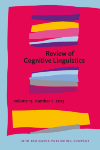
Review of Cognitive Linguistics
Enhancing Understanding of Language Through Cognitive LensesThe Review of Cognitive Linguistics, published by John Benjamins Publishing Co, is a premier academic journal dedicated to the exploration of cognitive approaches to linguistics. With an ISSN of 1877-9751 and E-ISSN 1877-976X, this journal provides a critical platform for researchers and professionals to disseminate their findings in the rapidly evolving fields of linguistics and language, alongside developmental and educational psychology. Hailing from the Netherlands, the journal boasts impressive standing within the academic community, as indicated by its 2023 Q1 ranking in Linguistics and Language and Q3 in Developmental and Educational Psychology. Additionally, its Scopus rankings reflect a strong position within the arts and humanities and social sciences categories. While currently operating under a traditional access model, this journal actively contributes to the overarching discourse within cognitive linguistics, and is a vital resource for those aiming to deepen their understanding of the intricate link between language and cognition. Researchers, educators, and students are encouraged to engage with the rich body of articles spanning its convergence years from 2010 to 2024, making it an essential read for those at the forefront of these interdisciplinary studies.

Suvremena Lingvistika
Illuminating the Complexities of Language and Communication.Suvremena Lingvistika is a distinguished open-access journal published by the Croatian Philological Society, dedicated to advancing research in the field of linguistics and language. Since its establishment, the journal has been pivotal in promoting scholarly dialogue within the linguistics community, especially among researchers and academics in Croatia and beyond. With an ISSN of 0586-0296 and an E-ISSN of 1847-117X, the journal has transitioned to an open-access model since 2007, ensuring that research is freely accessible to all. As of 2023, it holds a respectable Q3 ranking in the Linguistics and Language category, reflecting its potential contribution to the field. The journal's scope encompasses a wide array of linguistic disciplines, encouraging both theoretical and empirical studies. Supportive of new research, Suvremena Lingvistika aims to foster innovative approaches and methodologies in linguistics, making it an essential resource for students, researchers, and professionals eager to explore the complexities of language. With its ongoing publication until 2024, it continues to shape the linguistic landscape, providing valuable insights and fostering collaboration among scholars globally.
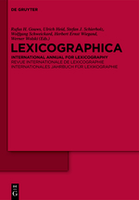
LEXICOGRAPHICA
Advancing Linguistic Knowledge, One Word at a TimeLEXICOGRAPHICA, published by WALTER DE GRUYTER GMBH, stands as an invaluable resource in the field of linguistics and language studies. With an ISSN of 0175-6206 and an E-ISSN of 1865-9403, this esteemed journal has garnered a solid reputation, reflected in its position within the Q2 quartile for linguistics and language as of 2023. Hailing from Germany, and with a robust publication history spanning from 1996 to 2023, LEXICOGRAPHICA offers a platform for scholarly discourse and innovative research concerning lexicography and its intersections with other linguistic fields. Ranked #442 in Arts and Humanities and #516 in Social Sciences by Scopus, it occupies a pivotal space in academic literature, making it essential reading for researchers, professionals, and students committed to advancing their understanding of language documentation and analysis. Although not open access, the journal’s commitment to high-quality peer-reviewed content ensures that it remains a respected outlet for original research, critical evaluations, and discussions that shape the future of lexicographic studies.

Lengua y Habla
Fostering Academic Excellence in Linguistics and LanguageLengua y Habla is a distinguished academic journal published by UNIV LOS ANDES in Venezuela, recognized for its contribution to the field of linguistics and language studies. With an ISSN of 2244-811X and a commitment to scholarly excellence, this journal has established itself as an important resource for researchers and practitioners alike since its inception in 2013. As of 2023, it is categorized in the Q3 quartile of linguistics and language, reflecting its significant presence in the broader academic community. The journal's Scopus rankings highlight its relevance, placing it in the 52nd percentile in Arts and Humanities and the 48th percentile in Social Sciences. Although it operates under a non-open access model, it provides valuable insights and innovative research aimed at advancing the understanding of language dynamics. With an address situated in the picturesque region of Merida, Venezuela, Lengua y Habla demonstrates a dedicated mission to promote rigorous academic discourse and foster engagement among students, researchers, and language professionals across the globe.
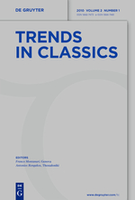
Trends in Classics
Elevating classical discourse for a modern audience.Trends in Classics is a distinguished academic journal published by WALTER DE GRUYTER GMBH, dedicated to advancing the field of Classics through critical scholarship and innovative research. With an ISSN of 1866-7473 and an E-ISSN of 1866-7481, this journal offers a platform for scholars from around the globe to share insights on classical literature, history, and archaeology. Indexed in Scopus and awarded a respectable Q4 classification in Classics, it ranks 48th out of 170 in the Arts and Humanities category, placing it in the top 72nd percentile—an indicator of its growing influence and contribution to the field. Operating from Germany, specifically from Genthin Strasse 13, D-10785 Berlin, the journal spans converged years from 2009 to 2024, fostering ongoing dialogues and developments within classical studies. Although it does not currently offer open access, its commitment to scholarly excellence makes it a vital resource for researchers, professionals, and students alike, who seek to deepen their understanding of ancient cultures and their lasting impacts on contemporary society.

Journal of Research in Applied Linguistics
Bridging Theory and Practice in LinguisticsJournal of Research in Applied Linguistics is an esteemed academic journal published by Shahid Chamran University Ahvaz, Iran, focusing on the dynamic field of linguistics and language studies. With an ISSN of 2345-3303 and an E-ISSN of 2588-3887, the journal has established itself as a valuable resource for researchers and professionals aiming to explore diverse issues related to applied linguistics, including language acquisition, pedagogy, and sociolinguistic interactions. As part of a robust academic community since its inception in 2017, it is recognized with a Q2 quartile ranking in the world of linguistics and achieved impressive Scopus ranks reflective of its growing impact, particularly within the arts and humanities. The journal embraces an open access policy, enhancing its reach and availability to a broad audience. Researchers, educators, and students alike will find in the Journal of Research in Applied Linguistics a critical platform for dialogue, innovation, and contribution to the evolving landscape of language research.
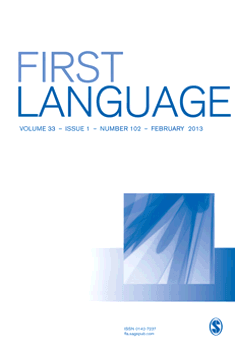
First Language
Unraveling the Complexities of First Language UseFirst Language is a prestigious journal dedicated to the study of language acquisition, development, and use, published by SAGE Publications Ltd. With an ISSN of 0142-7237 and E-ISSN 1740-2344, this journal has been a vital resource in the fields of Education and Linguistics since its inception in 1980. It proudly holds a 2023 Q1 ranking in Linguistics and Language and a Q2 ranking in Education, underscoring its significant impact and contribution to these dynamic fields. Positioned in the 91st and 90th percentiles in Scopus rankings for Language and Linguistics and Social Sciences, respectively, First Language attracts a global readership, fostering rigorous scholarly discussion and exploration. The journal is not Open Access, ensuring that its curated content maintains a high level of academic integrity and exclusivity. With a rich historical scope extending to 2024, First Language serves as an essential platform for researchers, practitioners, and students committed to advancing our understanding of language in all its complexities.

Voprosy Leksikografii-Russian Journal of Lexicography
Unveiling Contemporary Issues in LexicographyVoprosy Leksikografii-Russian Journal of Lexicography, published by TOMSK STATE UNIVERSITY, is a premier journal dedicated to advancing the field of lexicography and linguistics. With an ISSN of 2227-4200 and E-ISSN 2311-3758, this journal has established itself as a vital resource for researchers and practitioners in the discipline. As a recognized Q1 journal in Linguistics and Language (2023), it ranks impressively in the Scopus database, placing within the top percentile of both Arts and Humanities and Social Sciences categories. The journal aims to promote scholarly discourse through rigorous research, innovative methodologies, and the exploration of contemporary issues in lexicography. Despite not being open access, it remains pivotal for anyone engaged in linguistic studies, providing essential insights and fostering academic collaboration in the Russian Federation and beyond. For emerging scholars and seasoned experts alike, Voprosy Leksikografii serves as an indispensable platform for disseminating high-quality research in the rapidly evolving landscape of language studies.

Dacoromania
Navigating the evolving realms of language and literature.Dacoromania, published by the esteemed EDITURA ACAD ROMANE, is an Open Access academic journal that has been contributing to the fields of Linguistics, Language, Literature, and Literary Theory since 2011. With a mission to foster scholarly dialogue and facilitate knowledge dissemination, the journal enables researchers, professionals, and students to access a wealth of innovative research and critical scholarship without barriers. Although currently classified in the Q4 quartile for its categories in Linguistics and Literature, Dacoromania aspires to enhance its visibility and impact within these disciplines, providing a platform for emerging voices and ideas from Romania and beyond. The journal is openly accessible and invites submissions that push the boundaries of linguistic and literary studies, ensuring a vibrant exchange of thought in a rapidly evolving academic landscape.